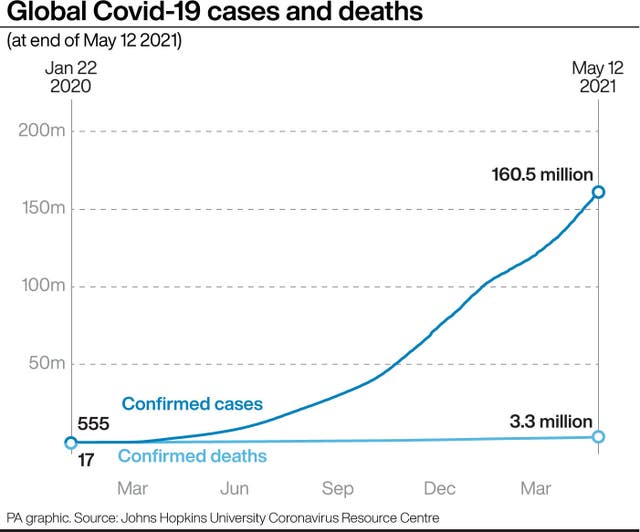Scientists keeping close eye on spread of Indian variant
The European Medicines Agency has said it is ‘pretty confident’ that vaccines currently in use will be effective against the Indian variant.

Scientists are keeping a close eye on the spread of the Indian variant across the UK, but there are currently no signs that infection is leading to rising hospital admissions, experts have said.
Professor Steven Riley, from Imperial College London, said that whether the road map for England continues on its planned trajectory was “a Government decision” but suggested the UK was currently in a good place, although variants were being watched.
He told Times Radio: “I think there’s two key things that have got to be kind of evaluated – if infections go up, how quickly will they go up? But then after that, are they linked to the hospitalisations?

“The top-line Government policy is driven by protecting the NHS, so even if infection starts to go up, we then need to assess whether that’s bringing a lot of new cases into hospitals, and there’s certainly no sign of that at the moment.”
On Wednesday, the European Medicines Agency said it was “pretty confident” that vaccines currently in use will be effective against the Indian variant – a view echoed by some British scientists.
Three types of the Indian variant have been identified in the UK, one of which is a variant of concern.
Professor James Naismith from the University of Oxford, however, said not enough was known to say for sure whether the variant could frustrate the UK’s vaccination programme.
“The vaccines don’t 100% prevent infection for people,” he told BBC Radio 4’s Today programme.
“What they do is, they almost 100% prevent hospitalisation and serious illness.

“We don’t know enough to know yet whether the Indian strain will behave differently than that.
“So even the regular virus can infect people who have been vaccinated and sometimes you do get reinfection.”
Prof Naismith said the variant may spread “way beyond” the local areas where it has been detected, suggesting much wider community transmission of the variant.
“I think we should view it as a country-wide problem,” he said.
“It will get everywhere. We keep learning this lesson, but we know that this will be the case.”
Prof Naismith said he did not believe local restrictions would work to contain the variant, adding: “When we tried locally having different restrictions in different regions that didn’t really make any difference.
“So I don’t think thinking about a localised strategy for containment will really work.”
Elsewhere, Professor Adam Finn, from the University of Bristol and a member of the Joint Committee on Vaccination and Immunisation (JCVI), suggested there was no firm plan for vaccinating teenagers and younger children.
He told BBC Breakfast: “We’ve not really had any discussions yet about immunising teenagers or indeed younger children.
“We don’t have any vaccines authorised for those age groups at the moment.
“But I think it’s also an open question as to whether or not we really will need to do that at this point and, in fact, if we can get really good coverage and a high uptake in the adult population, like Israel, we may find that you see a disappearance, if you like, of Covid throughout the whole population, even without immunising children.
“So that’s yet to be discussed, and it may prove necessary, particularly for teenagers, but it’s not clear that that will be necessary at this point in time.”
He said studies have been completed for the Pfizer vaccine in teenagers and are continuing for the Moderna jab, but it will depend on whether “there really are cases to be prevented”, particularly among schoolchildren.
“If it looks like there’s transmission going on in schools, particularly secondary schools, that would be in favour of doing this, and if there isn’t, then of course that would be in favour of not doing it,” he said.
Prof Finn also said he is not “particularly concerned” that younger age groups may shun vaccines.

He added that “we’re all optimistic actually that the programme will continue to roll forward as successfully as it has done so far.”
He said there is a “very strong sense in UK at the moment that everybody wants to be part of this – to be contributing to the effort and to seeing this pandemic off”.
Earlier, Professor Paul Elliott, director of Imperial College London’s React programme, cited the Indian variant when asked whether the study’s latest data supported a move into the next stage of easing lockdown restrictions.
He said: “It is a difficult question because we have low levels of prevalence in the community, and we’ve got low levels of disease in hospitals and deaths, so that’s good.
“But I think that the patterns in the Indian variant are cause for some concern.”
He added that further studies are needed to really understand the characteristics and the spread of the Indian variant, which appears to be at least as transmissible as the Kent variant.
The React study looked at variants of coronavirus and found that of 115 positive swabs, 24 cases were identified as the Kent variant and two of three cases in London were identified as the Indian variant of concern.
The experts said neither participant had been abroad in the previous two weeks.
The Scientific Advisory Group for Emergencies (Sage) is reportedly due to hold an emergency meeting on Thursday to discuss the spread of the Indian variant, amid fears it could have an impact on the Government’s road map out of lockdown.





